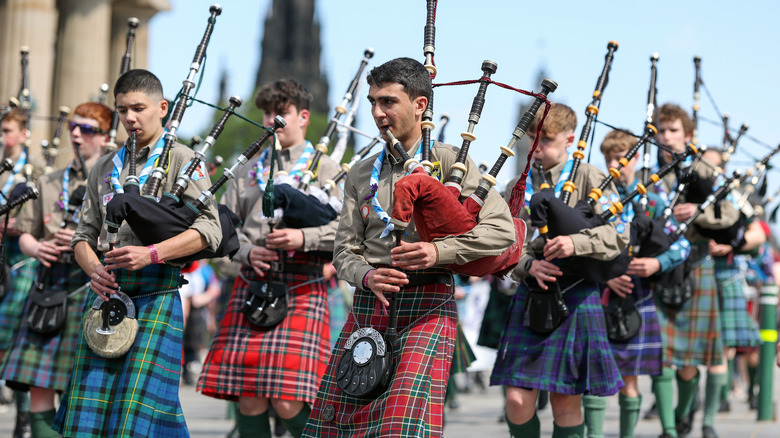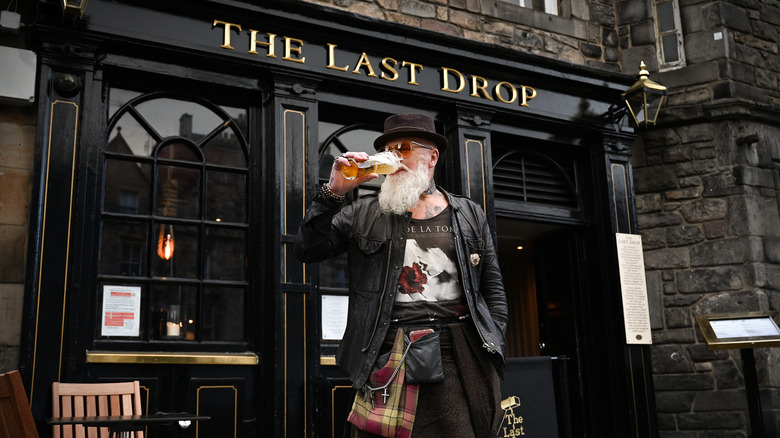Practice Good Dining Etiquette In Scotland By Learning How To Pronounce This Important Phrase
Whenever you visit a new country, it's a good idea to brush up on the cultural norms and basic etiquette rules. Knowing how to behave properly can make it significantly easier to meet people while traveling abroad. If you're a solo traveler who hopes to make new friends all over the world, understanding the common etiquette is crucial so that you don't do or say something rude. Learning a few key words and phrases of the local language is also a wonderful way to connect. Instead of accidentally offending the locals, impress them with your knowledge of their culture, language, and etiquette practices. Before you visit Scotland, one of the most beautiful countries in the world, consider learning a little Gaelic.
Scottish etiquette is similar to what you'd experience throughout the U.K., but before Scotland merged with England to form the United Kingdom, it was an independent country for hundreds of years. Scottish locals still share a unique cultural identity that is rooted in their shared history. Today most locals speak English as their primary language, but for hundreds of years, the Scots spoke a beautiful indigenous language called Gaelic.
Sadly, the language almost went extinct. It was first outlawed in 1616. In response to the Jacobite uprising, the British attempted to eradicate Scottish Gaelic further in the 1700s. When a universal education system was established Gaelic was not taught and children who spoke it at school were punished. Gaelic managed to survive and it is currently experiencing a renaissance. If you really want to impress the locals while traveling through Scotland, learn the traditional Gaelic phrase Slàinte Mhath which is used as a celebratory toast.
A traditional Gaelic toast for celebrations
The Gaelic language was brought to Scotland from Antrim Ireland around 1,500 years ago and was once the official language of the Scottish royal court. In the early 1920s, the Gaelic-only population fell by 46% and many feared the language might be lost forever. Today, more people living in Scotland are attempting to learn the language. The number of people who could speak Gaelic increased to 130,000 people in 2022 from 87,000 people in 2011 according to census data. Scottish people are proud of their culture, and learning a few words and phrases in Gaelic could show them your appreciation and reverence for their history.
Mastering the Gaelic phrase Slàinte Mhath is a great place to start. "Slàinte" translates to health and "Mhath" means good, so the phrase as a whole means "good health." It's commonly used as a toast just like "cheers" or "salud" are used in other parts of the world. You can use it to wish the recipient of your toast well and to celebrate almost any occasion.
If you're going to attempt to toast using the phrase Slàinte Mhath it's important to use the correct pronunciation. Gaelic can be a challenging language to learn, so spend some time practicing before you travel to Scotland. If you primarily speak English, the spelling will likely confuse you. The entire phrase is pronounced like "Slawn-cha va" or "Slanj-a-va". The "M" in Mhath is silent. If you type the phrase into YouTube, you can find a variety of videos demonstrating the correct pronunciation. It helps to hear it spoken out loud a few times.
When to use Slàinte Mhath
Scotland has an incredible pub culture, and pubs are an excellent place to meet locals while traveling abroad. Traditional Scottish culture is celebrated in these settings. It's one of the best countries in Europe for listening to live music, and some traditional songs are performed in Gaelic. You may hear people say Slàinte Mhath after a particularly lively pub performance. Whenever you're enjoying a pint of beer or a shot of whiskey at a pub, it's a wonderful time to propose a toast of your own.
You'll likely hear the jolly phrase at least a few times during your trip to Scotland – especially if you plan on experiencing the nation's whiskey culture. Whiskey is Scotland's national drink, and there are many iconic Scotch distilleries scattered across the country. Visiting a distillery is a highlight of any trip to Scotland and you will probably be taught the toast during your tasting. It's not just used to entertain tourists though — locals use it regularly. Birthdays and weddings are common settings where it's said often.
If you're going to use the phrase, do so confidently. Locals will appreciate your effort — especially if you spend some time learning the proper pronunciation.


